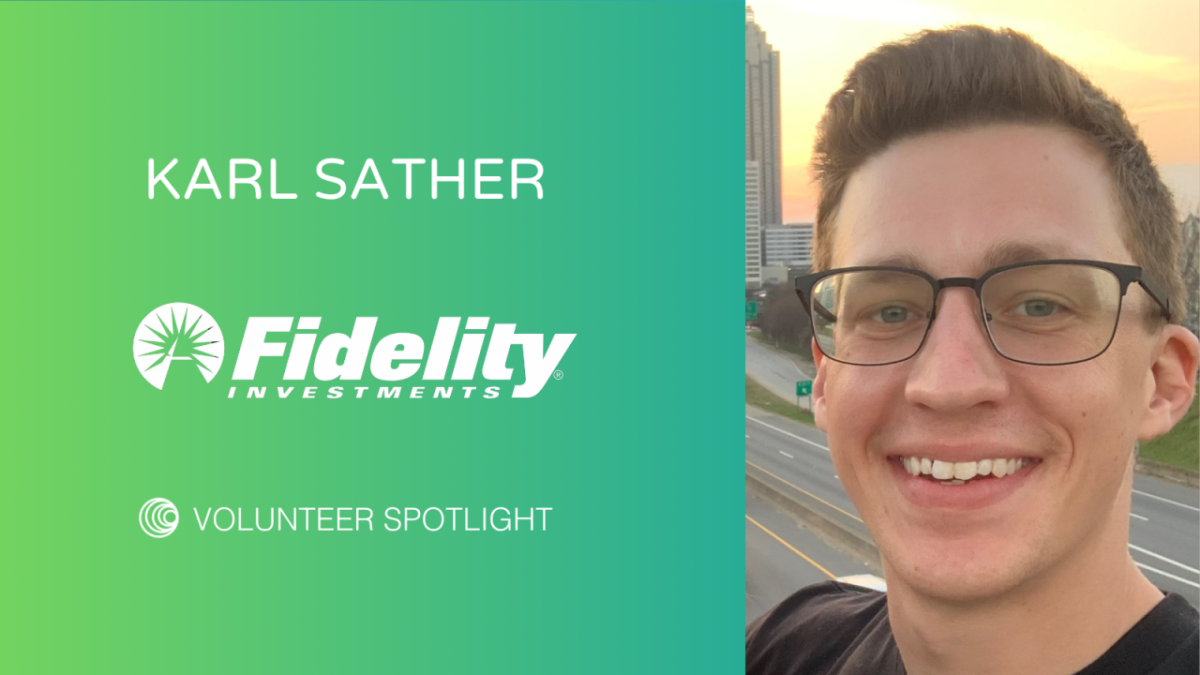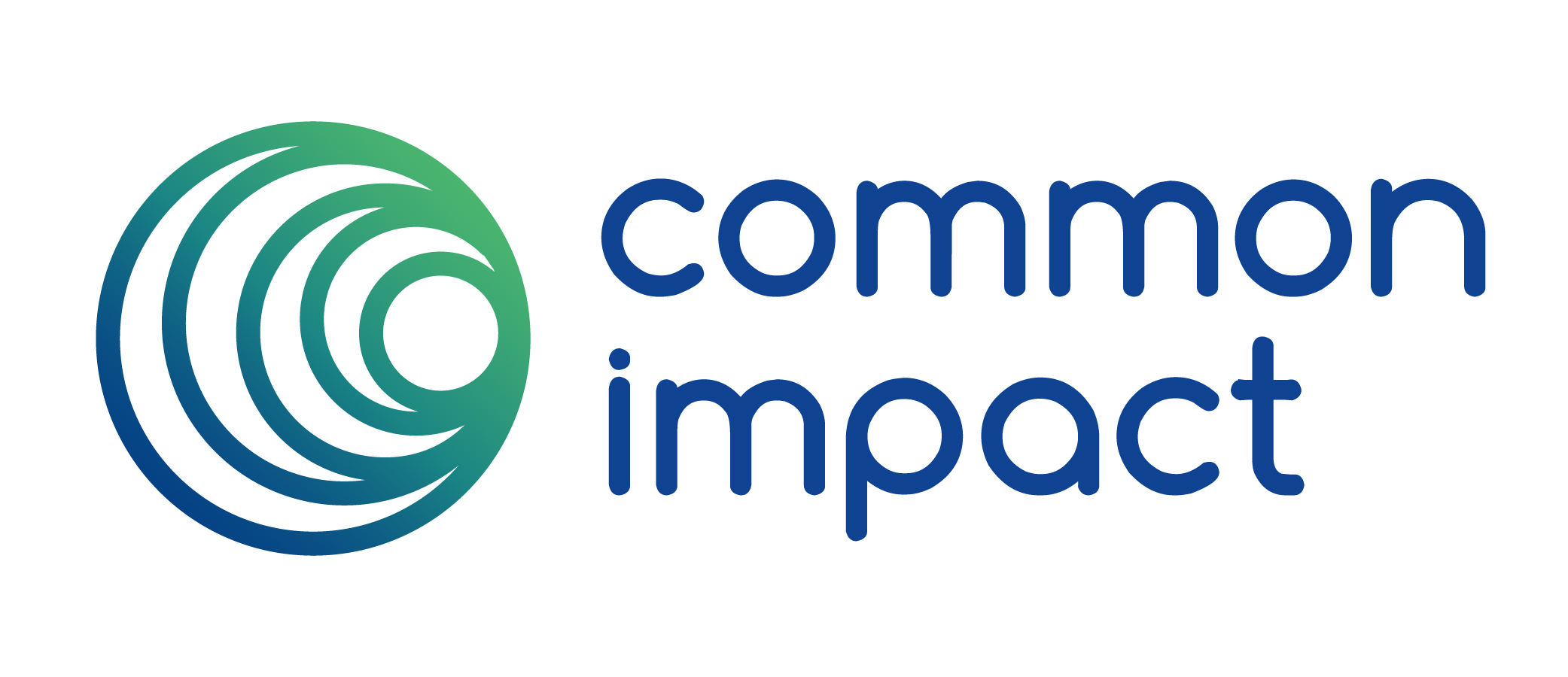Karl Sather’s Contributions to Social Impact at Fidelity Investments
Common Impact's Volunteer Spotlight

Originally published on commonimpact.org
Common Impact’s collaborative efforts thrive on the commitment of dedicated companies and their corporate volunteers who generously contribute their expertise to nonprofits. For 20 years, Fidelity and Common Impact have partnered to create impactful employee engagement initiatives, strengthening Fidelity’s social impact and incorporating community engagement into the employee experience.
We spoke with Karl Sather, a dedicated Fidelity volunteer. Karl has actively contributed to various projects and initiatives, including skills-based volunteering and mentoring the inaugural class of the Fidelity Investments Invest in My Education (ME) initiative. We learned more about Karl’s volunteering experience and his perspective on the significance of contributing to the greater social good.
Volunteering has done a lot to change my life for the better.
Tell us about yourself and why volunteering matters to you.
I grew up in Minnesota in a very tight-knit farming community. It was the type of community where everyone knew each other and greeted each other by name when we crossed paths. I’ve continued to practice the culture of selflessness and lending a hand throughout my life, which influenced me to give back, whether by donating to charities or volunteering.
I’ve worked and volunteered with several nonprofits, including the YMCA of Minnesota, YMCA of the Rockies, YMCA of the Triangle, and then the YWCA of Minneapolis. My first volunteer experience was with the YWCA to complete service hour requirements for a semester-long program called Girls on the Run. The program was designed to help girls in the community train for a 5K while teaching them life skills and mentoring them. That experience was life-changing and influenced my career and fueled my passion for volunteering.
What is your background and experience?
I like to think of myself as a Jack of all trades and master of some at this point in my life. I’ve worked mainly in customer service and leadership roles, operations, logistics, people management, strategic planning and recruitment. Outside that, I also acquired farming, venue management, animal care, construction, land management, and program management skills.
I realized I have many skills to give back through skills-based volunteering. When I saw the list of nonprofits that needed help through Fidelity and Common Impact’s skills-based volunteering programs, it was empowering to see I had many of the skills and expertise they needed.
You recently participated in a skill-based volunteering event with Fidelity and Common Impact. What was the challenge you collaborated on?
Equality Utah leads efforts for LGBTQ+ civil rights at the state and local levels by sponsoring LGBTQ legislation and opposing negative bills, lobbying elected officials, building coalitions, and empowering individuals and organizations.
Equality Utah staff are continuously thinking about leveraging their skill sets to serve more of its community. In working with corporations, particularly ERGs, and other employee affinity groups, Equality Utah realized that the leaders of these groups take on these roles voluntarily but don’t always receive the training, including leadership and advocacy resources needed to excel in these roles. As a result of their findings, Equality Utah has organized casual quarterly gatherings of ERG leaders across the state to learn from one another. Due to its success, Equality Utah wanted to host an annual summit in April 2024 that serves as an immersive leadership retreat for ERG leaders across the state—now called One Utah Summit Spring 2024. They envision this being funded through a corporate sponsorship model where companies sponsor a certain amount of ERG leaders to attend the summit. As they worked to put the annual summit together, Equality Utah sought a group of Fidelity volunteers to advise them on their value proposition for a corporate audience and the tools and resources they need to approach their corporate partners.
How did you use your professional skills to solve it?
My volunteer group helped them review their value proposition and provided recommendations for launching the conference successfully. We identified ways the organization can garner rapport with community members and businesses to create greater funding opportunities and bring in funding for operations, expansion, and safe spaces for LGBTQ+ folks in Utah.
I collaborated with my volunteer team to craft a comprehensive strategy for Equality Utah to establish meaningful partnerships with local companies, such as Fidelity. Our approach encompassed leveraging marketing best practices to cultivate support for their upcoming conference. There is a great opportunity to establish new connections and relationships with potential funders within the local population and thriving business communities.
What motivated you to try skills-based volunteering?
As I looked at the list of skills and expertise nonprofits seek through the skills-based volunteering programs, I realized how much I can give. I have several years of volunteer experience, so I understand some of the challenges these organizations face, such as a lack of resources, labor, and expertise, to address the unique challenges nonprofits face daily. I am motivated to help solve their challenges for those reasons.
How do you see your experiences in skills-based volunteering transferable to your professional life?
I learned so much from my peers, even in the short time I collaborated with them. The different ways of thinking were enlightening and allowed me to develop a deeper knowledge of what consulting and giving back to nonprofits can look like. The networking and personal connections I developed with folks from other business units within Fidelity, with whom I normally would never interact, have been invaluable. It helped breach potential silos within the company because everyone is so focused on their day-to-day. Through skills-based volunteering, we got to level with each other, met new people, and created new connections.
How did this experience affect your perception and awareness of Fidelity’s social impact initiatives?
I met folks involved in other special interest groups within Fidelity. It had been several years since I had volunteered, and the skills-based volunteering session I attended reinvigorated my passion to help others. After the first skills-based volunteering experience, I skimmed the Fidelity Cares webpage and found other special interest groups. Among them is the Impact Environmental group, which I started volunteering with, and other organizations I plan to donate my time to.
How do you think skills-based volunteering contributes to building a sense of community and shared purpose among employees within a company like Fidelity?
You can develop personal connections through collaboration, brainstorming, and execution. People bring their authentic selves and skills to the session, and it’s rewarding to see each person’s interests and expertise. These programs allow us to know each other on a deeper level through our discussions, which is very different from regular office talk.
Looking ahead, do you see yourself continuing to engage in skills-based volunteering? How do you envision it will shape your professional and personal growth?
I would love to continue to assist in the long and short term. Long-term consulting sounds fun because it would give me more time to aid the nonprofit’s success. I’ve interacted with board members at a local YMCA during a shadowing session of a board meeting and would consider serving on a board in the future.
Volunteering has done a lot to change my life for the better. I will continue this path and see what opportunities it brings me. I’ll either learn a new skill, meet new people, or get out of my comfort zone.
What would you tell someone new to skills-based volunteering and is unsure if it’s for them?
The self-discovery piece is the biggest takeaway from this. Through skills-based volunteering, you will realize that the skills you gained over time are highly valuable. It’s a retrospective and empowering process. You’ll learn potential skills you can continue expanding which may inspire you personally and professionally.
Everybody should try skills-based volunteering. There’s some uncertainty going into it for the first time, but the process of learning to adapt, ask questions and problem-solve is gratifying.
For more social impact content like this, follow us on LinkedIn and sign-up for our monthly newsletter. Ready to learn more about skills-based volunteering? Reach out.
# # #
About Common Impact
Common Impact is a national nonprofit that fosters meaningful partnerships between purpose-driven Fortune 500 companies and nonprofits worldwide to propel social good. Since 2000, Common Impact has generated over 205,000 hours of skills-based volunteering and $40 million in resources. Common Impact is dedicated to helping nonprofits expand their capacity, improve efficiency, and deliver on their mission with customized and impactful projects through corporate partnerships. Learn more about Common Impact’s services, impact, and clients.
# # #
Media Contact
Elizabeth Cross, Obviouslee Marketing
common-impact@obviouslee.com

